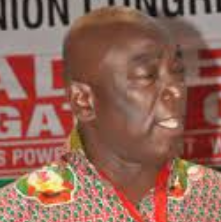By Konrad Kodjo DJAISI
The TUC’s assessment of the 2025 budget points to overprioritising macro stability, resulting in recurring bouts of macroeconomic instability.
This is reflected in persistence of the inflation problem, high interest rates, subdued economic growth and a depreciating national currency.
In its submission to government on the 2025 budget, the TUC indicated that Ghana’s recurring economic challenges stem from a flawed macroeconomic framework.
“In that framework, employment is treated as a residual outcome of economic growth and macroeconomic stability. This assumption has proven to be false, given that in the last 40 years of positive economic growth joblessness has increased and employment has shifted to the informal sector.”
This macroeconomic policy framework has led to handing over the natural resource sector – the most important sector of the Ghanaian economy – to foreign interests. “The framework effectively strips us of ownership of our gold and other natural resources.”
Meanwhile, trade liberalisation has over-exposed domestic enterprises to unsustainable foreign competition and wiped out many of them.
As part of the 2025 budget process, TUC had called for a reset and change of “…the failed macroeconomic policy framework”. Our objective is for a new model of economic management that will lead to ‘faster economic growth’ and accelerate the creation of decent employment.
TUC notes that the 2025 budget remains within the same macroeconomic policy framework as its predecessors.
“In a business-as-usual mode, the 2025 budget sets targets for inflation and growth but none for employment. It rests on the flawed assumption that once we tame inflation and the economy grows, good jobs will follow. Sticking with the framework means that we can only grow at 4 percent in 2025,” TUC laments.
“In the last 40 years, economic growth has averaged 5.5 percent. The countries that have transformed their economies in the last 40 years, including China, sustained double-digit growth for 30 years or more.”
Also, TUC drew attention to “some pertinent issues” regarding employment. First, is the absence of employment targets in previous budgets. Consequently, they called for employment targets in the 2025 budget.
The budget appears to not recognise the employment challenge. In fact, the macroeconomic targets for 2025 side-stepped employment. In a resetting mode, government must muster courage to set employment targets sector by sector and region by region.
“We must move away from the usual answer that there is no data on employment.” TUC urges government to prioritise support to the private sector as part of its efforts to create decent employment.
On the subject of wages, the body observed that wages on the Single Spine Salary Structure – from which the bulk of public sector workers are paid – have equally suffered massive declines in the last couple years.
It expressed interest in government’s desire to “complete work on revision of the Single Spine Pay Policy”. The TUC and its unions will work with government on these important issues.
Further, in 2025 the TUC will work with all other Organised Labour groups and ultimately with government to halt the real wage declines experienced over the last couple of years.










